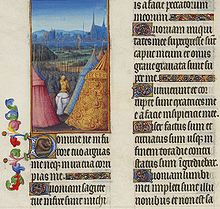Psalm 38
The 38th Psalm (according to Greek counting the 37th) is a psalm of David from the first book of the Psalter . He is included in the group of so-called penitential psalms .
content
The psalm begins - after an attribution to David and the classification as a memorial offering (verse 1) - with the psalmist describing his serious illness (verses 2–9). The prayer sees the illness as a result of his own sins . In the following verses (verses 10-21), in addition to lamenting the serious illness, there is also the lamentation that other people turn away from him and even host him. Those close to him shrink from his illness because they see it as a punishment from God. Although he knows about his own guilt and admits it to God (v. 19), he defends himself against the accusations. The psalm closes with a plea to God not to forsake the person who is praying and to help him (verses 22-23).
reception
The psalm was u. a. used in the chorals Great God, you love mercy ( EKG 180), (fr .: Clément Marot , German: Matthias Jorissen (1793)) and Herr Jesu Christ, du Höchstes Gut ( EG 219) by Bartholomäus Ringwaldt (1588) . Johann Sebastian Bach recorded psalm verse 4 in 1723 with the cantata It is nothing healthy in my body (BWV 25).
Web links
- Psalm 38 in the standard translation , the Luther Bible and other translations from bibleserver.com
- Psalm 38 in the Biblia Hebraica Stuttgartensia (BHS) on bibelwissenschaft.de
- Public domain sheet music of settings for Psalm 38 in the Choral Public Domain Library - ChoralWiki (English)
Individual evidence
- ↑ Stuttgart Explanatory Bible. 2nd edition., Deutsche Bibelgesellschaft , Stuttgart 1992, ISBN 3-438-01121-2 , p. 693 f.

